Happy Tuesday! Congratulations to the UConn Huskies on defeating the San Diego State Aztecs to win their fifth NCAA men’s basketball championship last night—and congratulations to Jackman12121 for coming from behind to win the third annual TMD March Madness pool!
If you finished in the top 25 and haven’t yet filled out this form, please do so today so we know where to send your prize! Winners should expect an email from us in the next day or two.
Quick Hits: Today’s Top Stories
- NBC News reported Monday the Chinese surveillance balloon that traversed the United States in February was, in fact, able to collect intelligence from sensitive U.S. military sites, though Defense Department spokeswoman Sabrina Singh claimed the military was able to limit the “additive value” of that intelligence. The balloon allegedly made multiple passes over targets—sometimes flying figure eight formations—and transmitted information, including images and signals intelligence, back to Beijing.
- Russian officials claimed their troops gained control of the Ukrainian city of Bakhmut Monday after a months-long offensive, though both Ukrainian officials and the White House said the fight for the city remains ongoing. The head of Ukraine’s presidential office said Russian declarations of victory—including those made by the mercenary Wagner Group head Yevgeny Prigozhin—are “not even close to reality.”
- Russian authorities arrested and charged a 26-year-old Russian woman on Monday with delivering the bomb that injured 30 and killed prominent propagandist and war blogger Maxim Fomin—known by his pseudonym Vladlen Tatarsky—in St. Petersburg on Sunday. In a video released by the interior ministry, Darya Trepova—who has previously attended anti-war protests—confessed to handing Fomin a statue of himself that allegedly contained the bomb, though unconfirmed reports suggest she may have been set up. The Kremlin alleged Monday Ukraine had orchestrated the attack, a claim Ukrainian officials deny.
- The Israeli military shot down two unidentified aircraft near Israel’s northern and southern borders Sunday night and Monday morning. While officials said neither aircraft posed a threat, the one hailing from Syria in the North crossed into Israeli territory. Israel has reportedly launched three rounds of airstrikes against Syria in the last several days, and amid the tense security situation, Israeli Prime Minister Benjamin Netanyahu has temporarily suspended his decision to fire Defense Minister Yoav Gallant—dismissed last month for opposing Netanyahu’s judicial reforms.
- House Speaker Kevin McCarthy announced Monday he will host a bipartisan meeting with Taiwanese President Tsai Ing-wen on Wednesday at the Reagan Presidential Library in California. The rumored meeting had already prompted a promise of retaliation from China, and will likely result in renewed Chinese military maneuvers near Taiwan.
- The Justice Department on Friday announced the arrest of an Ohio man accused of using Molotov cocktails in an effort to burn down a church in Chesterland, Ohio, last month that was set to host a drag show event. The 20-year-old man was part of a “White Lives Matter” group and had previously participated in a protest at a drag show during which members of the group carried Nazi flags.
- Florida Gov. Ron DeSantis signed a bill Monday making Florida the 26th state to allow eligible gun owners to carry concealed firearms without a permit. Once the law goes into effect on July 1, Floridians will no longer need to attend a training course to carry their guns in a concealed manner outside their homes.
What Would a TikTok Ban Actually Look Like?
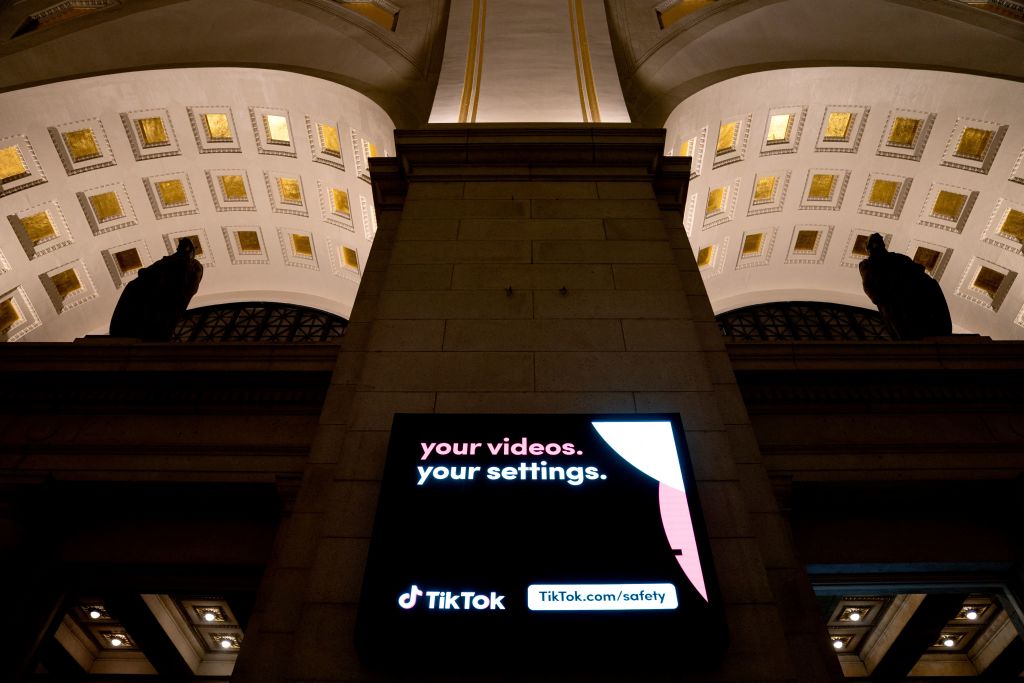
U.S. officials seem to finally be getting serious about TikTok. After years of talk, the Chinese-owned social media platform is now banned on federal government devices, as well as government devices in more than half of states in the country. The Committee on Foreign Investment in the United States (CFIUS)—a body that reviews international transactions for potential national security risks—issued TikTok an ultimatum last month, telling the company to either ditch its Chinese parent company or get out of the country. Both Democratic and Republican lawmakers have introduced multiple bills targeting the app. And, as we noted last month, CEO Shou Zi Chew’s appearance before Congress only added fuel to the fire.
Now, lawmakers may actually pass a ban. How exactly would it be implemented? It’s complicated, but not impossible.
“I think a ban could be done,” Daniel Gonzales, an expert on cybersecurity and senior scientist at the RAND Corporation, told The Dispatch. “The infrastructure that TikTok operates in the U.S. would be shut down, those IP addresses would become illegal.”
A ban would require app stores, internet service providers (ISPs), and computer and phone software providers to take steps to block access to TikTok. “The challenge is it would have to be done by the private sector in the U.S.,” Gonzales said. “The ISPs would have to become involved in banning some of those IP addresses.”
People could use Virtual Private Networks (VPNs) to get around banned IP addresses, but that extra step would likely prove a barrier for most would-be users. And there are other ways to limit access to the app, even with VPNs. Klon Kitchen, a cybersecurity expert and former Dispatch contributor, outlined a path for a ban using Digital Rights Management technology—a common software used to control access to copyrighted material—to make VPN workarounds more difficult.
“Number one, all U.S. app stores would be legally prohibited from hosting the app or downloading it,” Kitchen said in an interview. “Two, all of the operating systems, both desktop and mobile systems, would update their operating system and use the [digital rights management] technology to prevent Tiktok from running on their machines.” Although users could use a VPN to download the app, he added, phones with updated software wouldn’t be able to run it.
India has successfully outlawed TikTok for nearly three years by requiring Apple and Google to remove it from their app stores and mandating that ISPs block connections to the platform. When the app was first banned in 2020, there were almost 200 million TikTok users in India. “For those who argue that there is no way to ban an app, India is an example of a country that has done it and done it successfully,” Brendan Carr, a Republican Federal Communications Commissioner, said in January.
No version of a nationwide ban would successfully block every route to TikTok, but there are ways to prevent the average user from accessing the app. “What happens is you immediately narrow greatly the user base, so that the benefits of being on TikTok are greatly diminished,” said Kitchen. “At the point where 90 percent of your friends aren’t on there anymore it’s not that attractive.”
There are also economic sticks at the government’s disposal. Just as the White House has imposed sanctions on various Russian or North Korean entities in recent years, officials could prohibit U.S. advertisers and banks from doing business with TikTok, effectively crippling the company’s American business operations.
And while an all-out ban is a serious step, it may be more straightforward than regulating and monitoring TikTok to prevent the Chinese government from accessing U.S. user data or influencing content on the platform. An effective monitoring regime would require auditing TikTok’s extensive source code, a lengthy and difficult process if the code is regularly updated. And TikTok’s proposed “Project Texas” oversight plan—which would require American user data to be stored on Oracle servers in the United States—has already been criticized over reported deficiencies and vulnerabilities. “[A ban] would probably be much easier,” Gonzales said.
If a ban is technically feasible, albeit complex, the government’s legal authority to implement one is less certain.
In 2020, for example, the Trump administration’s attempt to ban the app via executive order was blocked in court. The executive order relied on the president’s authority under the International Emergency Economic Powers Act (IEEPA)—a law that enables the president to regulate and block economic activity from foreign actors. Several of the recent legislative proposals to ban TikTok—including the DATA Act—would expand IEEPA to give the president explicit authority to implement a ban.
The RESTRICT Act, a bipartisan proposal backed by the White House, would create a framework and new authority outside of IEEPA for the Commerce Department to review and block transactions from adversarial countries—specifically, China, Cuba, Iran, North Korea, Russia, and Venezuela. While opponents of the RESTRICT Act argue it’s overbroad and grants too much power to the executive branch, supporters say the legislation’s sweeping nature is designed to deal with emerging technological threats including TikTok and beyond.
“The RESTRICT Act provides a reasonable amount of authority to the president at a time when we know that adversary nations are using technology and these capabilities for problematic purposes,” said Jamil Jaffer, the director of the National Security Institute at George Mason University and former White House associate counsel in the Bush administration.
TikTok, for its part, does not plan to go down without a fight, engaging in a lobbying blitz and advocacy campaign—bringing in a bipartisan who’s-who of influential former officials—in an effort to stave off federal scrutiny. But concerns surrounding the app remain high, particularly over the potential for the Chinese government to use TikTok for its influence operations.
“They may not be doing a lot of it today in the U.S., because of the concern about a ban,” Gonzales said. “But it’s not going to be an issue that goes away if there is no ban.”
‘Let Him Go’
Last Wednesday, Wall Street Journal Russia correspondent Evan Gershkovich walked into a steakhouse in the city of Yekaterinburg, about a 1,000-mile drive east of Moscow—and disappeared. Colleagues’ texts and rings of his apartment doorbell went unanswered.
He surfaced the next morning in Moscow—hustled between van and courthouse with an officer’s hand pushing his head down—facing charges of espionage that the Journal and U.S. officials have dismissed as utterly baseless.
The arrest may be intended to intimidate other journalists or to set Gershkovich up as a bargaining chip in negotiating for the release of Russian spies detained abroad. But the reporter could be behind bars for a long time. Although Washington and Moscow have executed high-profile prisoner swaps in recent years, the severity of espionage charges make an exchange far less likely. According to state-run media, he has denied the allegations, but the court ordered him detained until at least May 29.
The 31-year-old son of Russian Jews who fled the Soviet Union and settled in New Jersey, Gershkovich had already been living in and covering Russia for several years and considered himself a Muscovite when he joined the Wall Street Journal in January 2022. He texted a friend that the job offer had made him tear up: “Can pay off student loans and help parents. Feel like I made it.” He also wrote to a former New York Times colleague who had encouraged him not to give up on journalism. “I’m the Moscow correspondent,” he wrote. “I did the thing. Look at us!”
Like many Russia-based correspondents, Gershkovich fled the country as it cracked down on journalists in the early days of its invasion of Ukraine. Independent Russian news outlets like Novaya Gazeta and TV Rain permanently shut down or moved abroad amid increasing repression.
But as the war continued, some Western correspondents trickled back despite State Department warnings urging U.S. citizens to steer clear. Gershkovich joined this cautious return, filing stories on Russia-China relations, wartime life in Moscow, and most recently, the economic toll of international sanctions. He was reportedly working on a piece about the mercenary Wagner Group when he was detained.
Russia hasn’t detained an American journalist on espionage charges since the Cold War. Gershkovich was accredited by Russia’s foreign ministry, which had previously assessed and approved his credentials as a reporter. Yet the FSB—successor to the KGB—accused him of “acting on the instructions of the American side” to collect military industrial information “not related to his journalism.” Kremlin spokesman Dmitry Peskov insisted officials caught Gershkovich “red-handed,” though neither he nor any other Russian official has offered any evidence for the accusation. Gershkovich faces up to 20 years in jail if convicted—and though Russian law means we’ll likely have little information about his trial, espionage acquittals are virtually unheard of in Russia.
The Journal “vehemently denie[d]” the allegations against Gershkovich and called for his release over the weekend.“No reporter should ever be detained for simply doing their job,” a statement read. While the State Department hasn’t yet completed the bureaucratic steps to officially label Gershkovich wrongfully detained, U.S. officials have echoed the Journal’s call. National Security Council spokesman John Kirby declared the charges “ridiculous,” and President Joe Biden urged Russia to “let him go.” In a rare conversation with Russian counterpart Sergey Lavrov, Secretary of State Antony Blinken conveyed “grave concern” over the detention.
Gershkovich’s arrest could make foreign correspondents think twice about their work in Russia. “Keeping Evan Gershkovich in custody is tantamount to taking a hostage,” French media editors wrote. “It is a warning, a threat, even an act of terror directed at the last representatives of international media still present in your country.” Other reporters are reconsidering the risks—New York Times correspondent Valerie Hopkins, for example, has reportedly opted to steer clear of the country for the time being.
But discouraging journalism may just be an added bonus to another Kremlin goal—retaliating for prosecution of its foreign agents and gaining leverage for future prisoner exchanges. Possible targets for a swap include Maria Mayer and Ludwig Gisch, alleged Russian spies arrested in Slovenia in December, and Sergey Cherkasov, another alleged Russian agent whom the U.S. charged late last month.
There’s recent precedent, of course, for successful exchanges even amid current tensions—but the details of Gershkovich’s situation make a repeat less likely. In December, the U.S. traded convicted arms dealer Viktor Bout for basketball player Brittney Griner, detained in February 2022 and sentenced to nine years for carrying hashish oil in her luggage. But Griner’s drug charges were mild compared to Gershkovich’s espionage ones—Gershkovich’s situation is closer to that of Paul Whelan, corporate security executive and former Marine accused of spying in 2018 and still in Russian custody. Plus, Mayer, Gisch, and Cherkasov are all being held outside the U.S., meaning a third country would need to agree to any swap.
Russian officials likely won’t even start negotiating any exchange until the conclusion of Gershkovich’s trial, which may take several months. In the meantime, prison monitor Alexei Melnikov—a member of the Moscow Public Monitoring Commission—visited Gershkovich in Lefortovo prison Monday and said he “joked a lot” and is reading Vasily Grossman’s Life and Fate, a novel about the battle of Stalingrad.
Gershkovich is no stranger to Russia’s crackdowns and the waiting game once detained. “Reporting on Russia,” he wrote last summer, “is now also a regular practice of watching people you know get locked away for years.”
Worth Your Time
- As Benjamin Netanyahu hits pause on his controversial judicial reforms, Yuval Levin offers a potential solution to the crisis: an American-style constitution. “The problem is the absence of a constitutional framework for Israeli political life—a shortage of mechanisms to balance majority rule and minority rights,” he writes for the New York Times. “That means this crisis needs to be a beginning and not an end. Exactly because we have always been divided, the American experience is actually highly relevant to Israel’s circumstances. Our Constitution arose in response to undeniable evidence of the inadequacy of our original system of government, and it created a formal arrangement of powers that aimed to balance the seemingly contradictory objectives of empowering majorities and protecting minorities. It has done that by establishing a variety of legitimate power centers—in different branches and different levels of government—and compelling them to both compete and cooperate. It needs to be the impetus for a process of constitution-making in Israel. A crisis may seem like a difficult time for such forward-looking political reform. But on that front the American experience offers one more lesson: Opportunities for significant reform are created by crises of legitimacy.”
- Female long-haul truck drivers are few, and their challenges unique. But for some, like Jess, profiled in N+1 Magazine by Meg Bernhard, trucking is a kind of salvation. “I met Jess through REAL Women in Trucking, an advocacy group focused on labor rights, particularly for women drivers,” Bernhard writes. “That year, Jess’s daughter Halima turned 19, the same age Jess was when she had her.” Jess left Halima’s father “after three years squirrelling away leftover grocery money. Jess kept a secret credit card, she told me, and left their home only with the clothes she was wearing. She went to her stepdad’s, applied for a trucking job, and was on a bus to a training facility in Indiana four days later. Halima spent fifth grade on the road. They solved math problems with dry erase markers on the truck’s windows and played catch in warehouse parking lots. ‘No one says, ‘I’ve always dreamed of being a truck driver,’ Jess told me. Trucking saved her, she said, but she still got lonely. ‘I have blue days,’ Jess said. ‘If I slammed my truck into a mountain, would anyone notice? Does anyone know I’m out here?’”
Presented Without Comment
Also Presented Without Comment
Also Also Presented Without Comment
Toeing the Company Line
- It’s Tuesday, which means Dispatch Live (🔒) returns tonight at 8 p.m. ET/5 p.m. PT! The team will discuss the news of the week and, of course, take plenty of viewer questions. Keep an eye out for an email later today with information on how to tune in.
- In the newsletters: Nick writes about (🔒) the possible Donald Trump mugshot, the Dispatch Politics team covers the 2024 ripple effects of the former president’s indictment, and Kevin focuses on (🔒) prosecutorial discretion. “Having a government you can trust and institutions you can rely on saves you a hell of a lot of money, time, and trouble,” he writes. “There is no escape from official discretion, and ‘Quis custodiet ipsos custodes?’ is a question that eventually has to be answered with real people in whom we place our trust because we do trust them, because we can trust them.”
- On the podcasts: Sarah and David discuss a Supreme Court case on immigration and Tennessee’s new anti-drag statutes, while Sarah and Steve check in (🔒) on their High Steaks bet.
- On the site today: James C. Capretta unpacks the crisis currently facing Britain’s National Health Service.
Let Us Know
Do you think a U.S. ban of TikTok would have similar results to India’s ban? How much “black market” or underground usage of the app do you expect would continue?



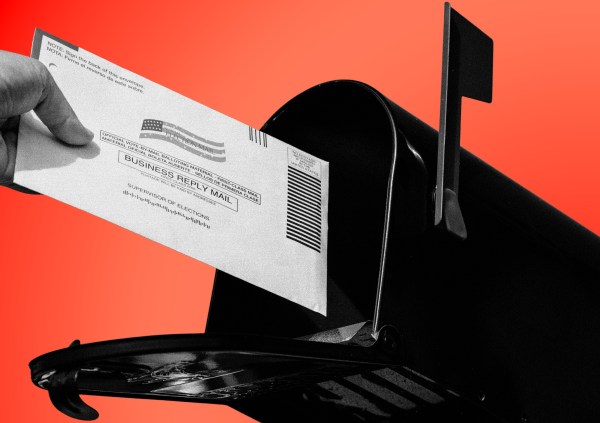
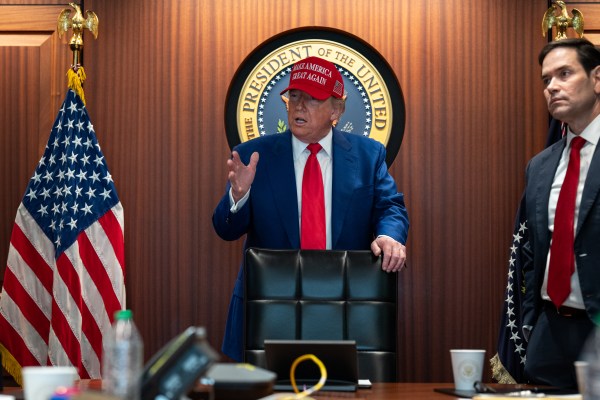
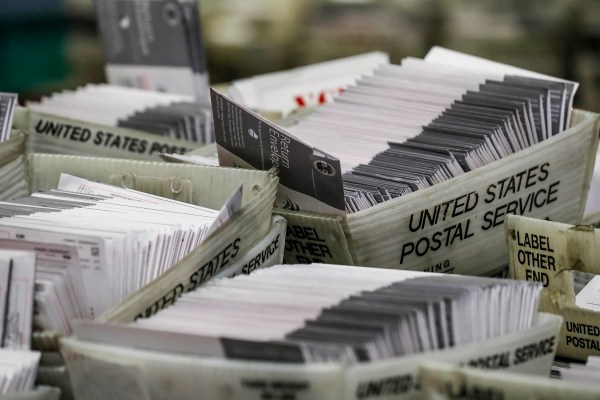
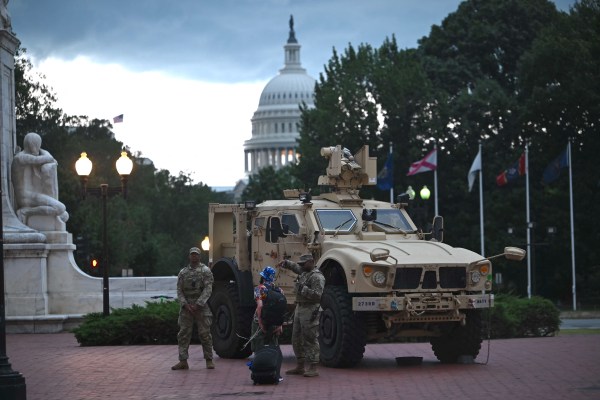



Please note that we at The Dispatch hold ourselves, our work, and our commenters to a higher standard than other places on the internet. We welcome comments that foster genuine debate or discussion—including comments critical of us or our work—but responses that include ad hominem attacks on fellow Dispatch members or are intended to stoke fear and anger may be moderated.
With your membership, you only have the ability to comment on The Morning Dispatch articles. Consider upgrading to join the conversation everywhere.